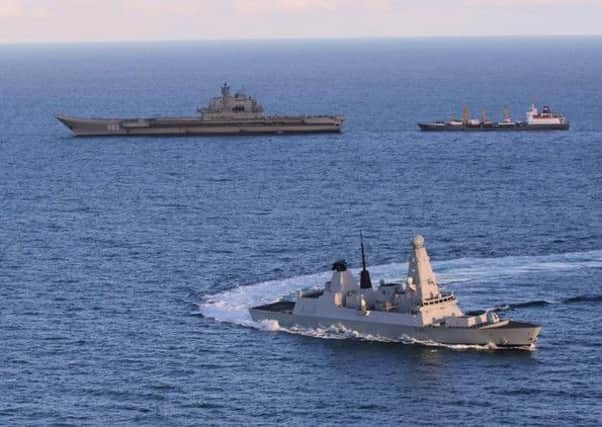MoD ‘used Twitter’ for Russian warship information


During defence questions in the Commons, Mr Hammond insisted claimed it was “entirely false” to suggest the UK had been caught unawares by the Russians or that there was a stand-off when the Admiral Kuznetsov aircraft carrier and its task force passed through the UK’s area of interest between 28 December and 10 January.
He told MPs that the UK had notice of their arrival through monitoring social media websites where the Russian Navy had declared their deployment.
Advertisement
Hide AdAdvertisement
Hide AdThe incident was the second involving the Admiral Kuznetsov in two years when it entered Scottish waters off Moray in 2011, and in the latest incident HMS Defender was ordered to sail from Portsmouth to the waters north of Scotland to escort the Russian task group.
His comments on social media though brought renewed pressure on Mr Hammond to look at basing a ship in Scotland and replacing the maritime surveillance aircraft which has been identified by the Defence Select Committee as the UK’s most serious strategic gap since the cancellation of the replacement Nimrods in 2010.
Former Tory defence minister Sir Gerald Howarth joked he was “immensely grateful” for the role played by social media in providing intelligence to the UK, as he pressed for a replacement to the Nimrod aircraft.
He said: “Can I put a serious point of view to you that surely this really does underline the need for this Government, this country to have a successor to the Nimrod maritime patrol aircraft and that until we get such a successor aircraft we are going to be at risk.”
SNP Westminster leader and defence spokesman Angus Robertson pointed out that a recent answer had shown that there had been gaps in the UK’s fleet ready escort over the last three years.
He said: “Last week the Ministry of Defence confirmed that the fleet ready escort has been gapped for 37 days in recent years. Why has there been a gap to the fleet ready escort?”
The Defence Secretary refused to say why the gaps had occurred but told Mr Robertson he was “flogging a dead horse”.
He went on: “We don’t need a frigate stationed in Scottish waters. What we need is good intelligence about the intentions of vessels approaching the UK’s area of interest and we have that good intelligence.”
Advertisement
Hide AdAdvertisement
Hide AdOn finding a maritime surveillance aircraft to fill the UK’s capability gap, Mr Hammond replied: “We need to look at how we provide maritime surveillance cover and that will be part of the 2015 strategic defence and security review.”
But he added: “I’m afraid you can’t argue that this incident demonstrates that need. In fact, this incident shows we are perfectly capable of maintaining an intelligence picture through imagery, through signals intelligence, through reports from our Nato-allies of movements of Russian ships without having access to maritime patrol aircraft.”
However, concerns were raised about Russia’s strategic interest and how Scottish independence could leave a gap in UK defences.
Father of the House Sir Peter Tapsell asked Mr Hammond: “If it is safe to assume that these Russian warships were not planning to bombard (Scottish First Minister Alex Salmond), may we assume that they’re there to establish the unimpeded rights of Russia to exploit oil in the Antarctic and if so are we going to have reciprocal rights to look for oil in the Russian Antarctic?”
And Tory Barrow and Furness MP John Woodcock said: “Does not the debate on this issue underline the importance of our combined—UK—Royal Navy, and also the potential in the strategic NATO alliance? Does the Secretary of State not agree that, in the words of another political figure, it would be ‘unpardonable folly’ to put at risk that NATO alliance by disavowing the very strategic nuclear concept on which it is based?”